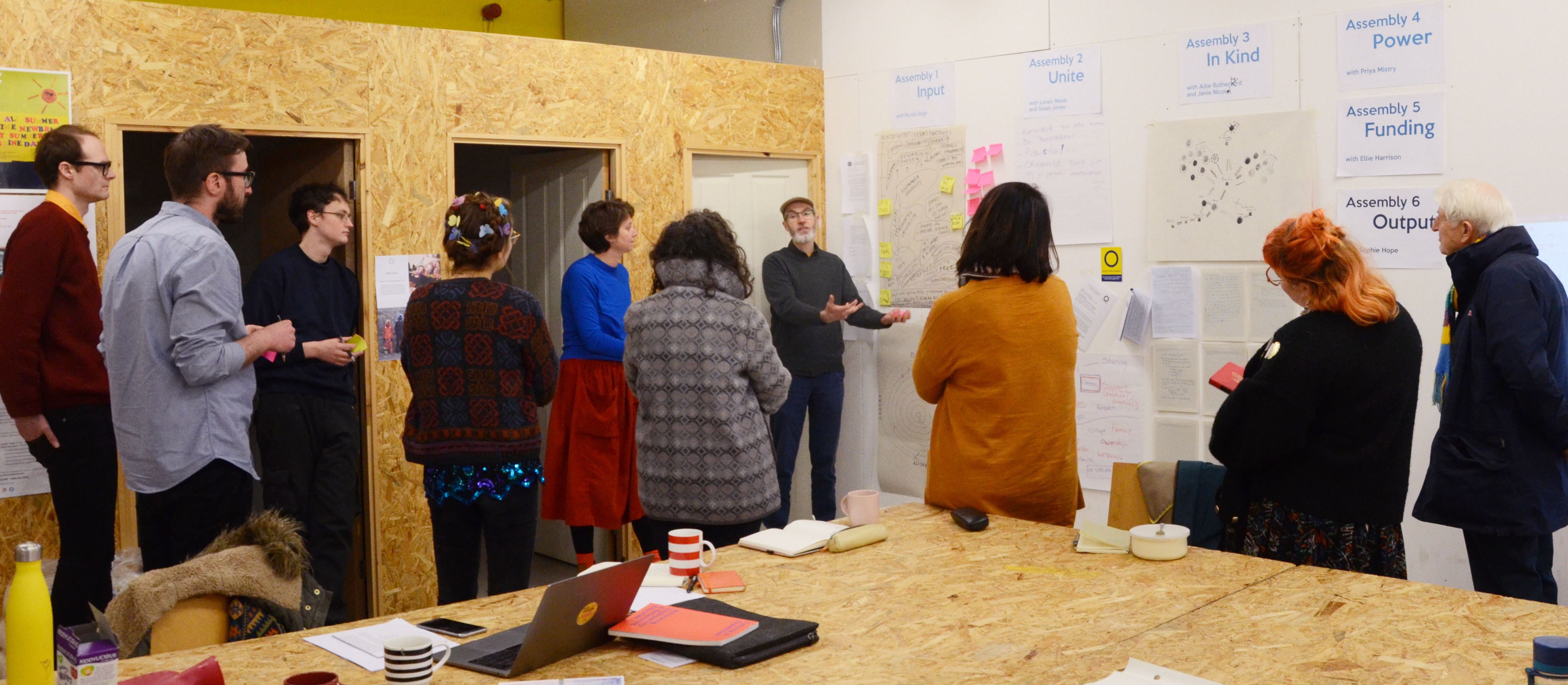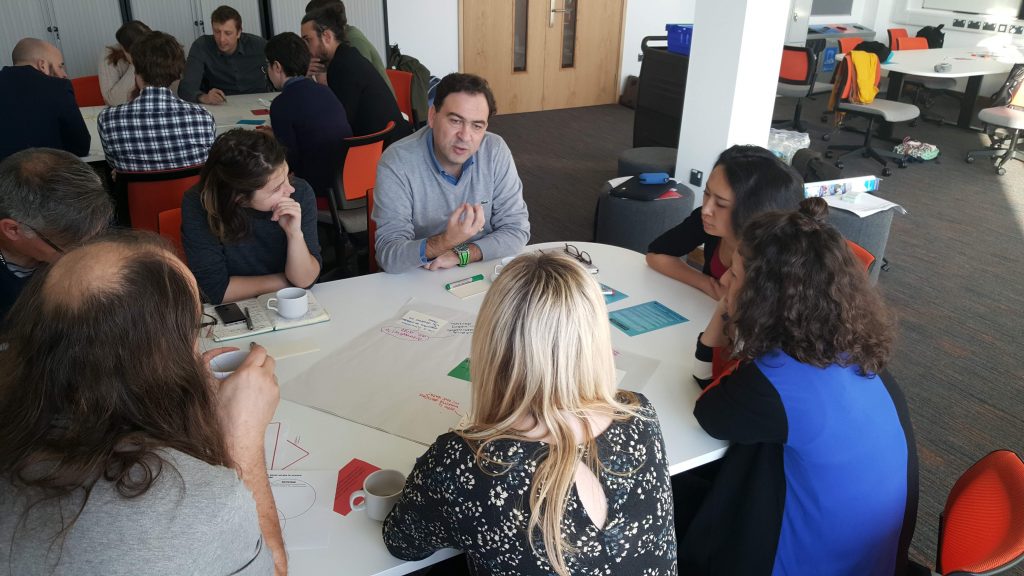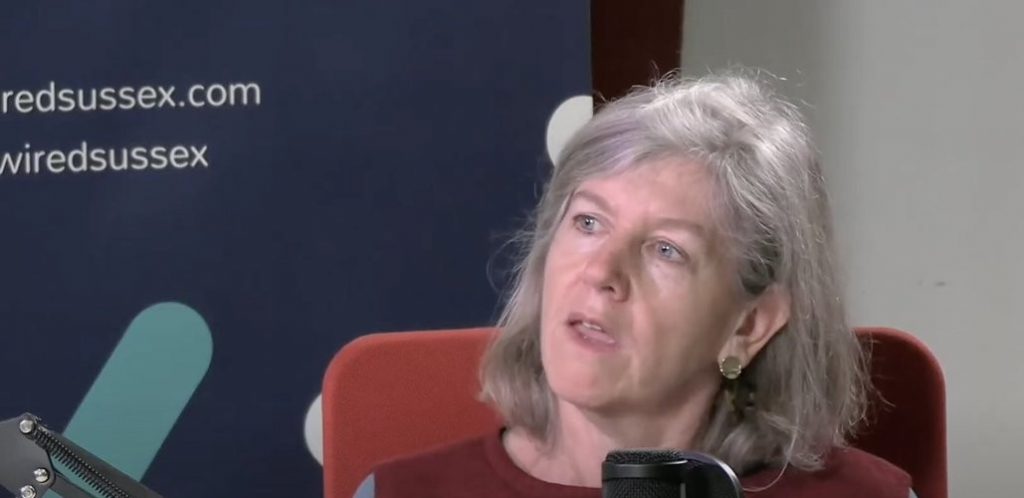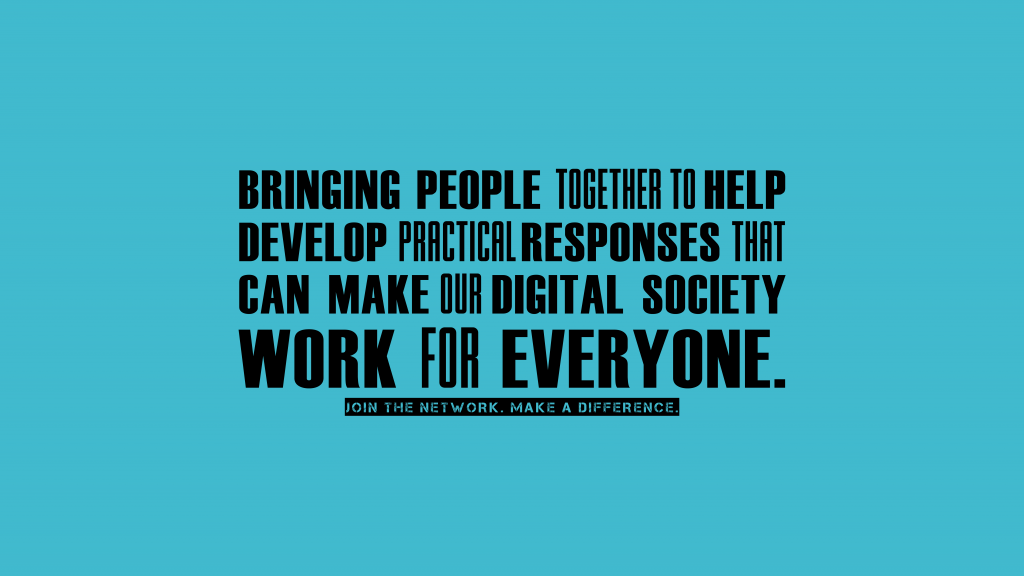
A workshop with artists during the Opening Doors project
The project Opening Doors: Art and Inequality in the Platform Economy ended in December 2019. This was one of three micro projects funded by Not-Equal during its first call for proposals.
It centred on a series of six workshops hosted by and produced in collaboration with Newbridge Project at their space in Gateshead. These workshops, collectively entitled ‘Assembly: A Forum for Artists in Precarious Labour’ were conceived of as spaces in which artists could freely and frankly discuss their working lives without inhibitions. The events were designed to serve as opportunities for people to share lived experiences, as well as tactics and strategies for alleviating the impacts of precarity.
The six workshops were curated by artist and co-Investigator Lucas Ferguson-Sharp, and were moderated and facilitated by artist and researcher Toby Lloyd. Each workshop was led by an invited artist(s), whose practice resonated with the themes of the project.
Participants for the workshops were made up of a varied group of local artists, art workers and students. A core group of around 10 attended most/all workshops, while a further 40 attended one or more workshops. These were drawn from various local networks and attendees represented a wide diversity of ages and genders, although racial diversity was minimal.
Nicola Singh’s first workshop, ‘Input’, promoted self-reflection on the project, and centred on various mapping exercises through which to understand the institutional network that Assembly was imbricated within. Subsequent events focused on unionisation in the arts sector, the proliferation of unpaid and ‘in kind’ work in art, diversity and representation within the sector, and alternative funding strategies and sources.
Each topic served as both a provocation for thought and reflection on people’s conditions and experiences, and as a forum for action and the sharing of resources. Participants mapped their own individual economies; shared experiences of unionisation and its difficulties within a sector dominated by freelancing; produced drafts of collectively written demands for change within the sector; and reflected on their own privileges and how they might relate to their ability to maintain a poorly paid and precarious career.
The final workshop, ‘Output’, led by Sophie Hope, afforded the opportunity to consider outputs and future directions for the project, which will hopefully be able to count on the continued investment and shared ownership of the participants.
The final workshop crystallised the issues that emerged into a selection of key insights:
- Knowledge: A key concern, especially among younger or newer artists, was their lack of knowledge of key and practical information associated with working as a freelancer in the cultural sector. There was considerable inter-generational conversation and guidance between participants, and a broad agreement that this knowledge-sharing would be beneficial to the sector as a whole if scaled up.
- Transparency: The taboo nature of conversations regarding one’s own finances and working conditions was considered to be a major barrier to progression on issues of precarity within the sector. This lack of openness means that systemic issues are perceived as and become personal.
- Solidarity: Participants highlighted the many barriers to forms of solidarity amongst workers in a sector dominated by freelancing, low pay and undercutting as well as creativity and individualism. Conversations particularly revolved around unionisation as a necessary but difficult process.
- Psychological and physical impact: The non-economic impacts of precarity were discussed.
- Insulated Community: While the workshops were focused on art workers, the lack of knowledge of the rights and standards of other labour sectors was apparent. Solidarity could be created by sharing knowledge with other sectors.
As a result of these conversations, the project team discussed extensively how the project and its insights might lead to practicable, beneficial and tangible impacts for the sector. As it was agreed that pooling practical resources was essential, the team is in the process of establishing a resource hub – both physical and digital – for art workers.
Next steps …
Plans for hosting the physical resource hub are currently being negotiated with the Newbridge Project and the Star and Shadow Cinema. Both of these spaces are ingrained within the North-East’s arts infrastructure and are founded on an artist-led, activist ethos that echoes the intentions of the project.
The establishment of the digital resource hub will follow. It will gather materials available in the physical hub, and further research will be directed towards how to make the most of the different opportunities afforded by digital space.
Work on the production of the online/offline resource hub will be supported by further research into organisation and solidarity amongst gig workers, with particular focus paid to recent unionisation efforts amongst Deliveroo riders. This is seen as a key comparator for attempts to unionise workers in the art field, with lessons to be learned both from their successes and failures.



